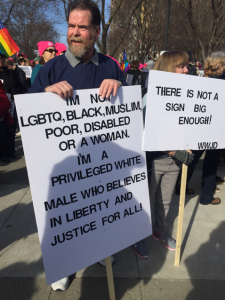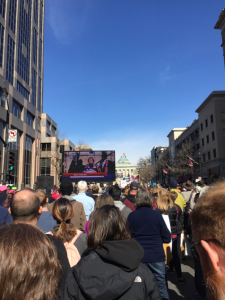By Molly Weybright
Fayetteville Street brimmed with people on Feb. 11, 2017 as the crowd for the Moral March on Raleigh seeped into the adjoining streets like water into cracked concrete. It was nearly impossible to move without bumping into another person.
But the agitation that often develops in overcrowded spaces was missing. In its place was an incredibly powerful feeling of togetherness. As people of all ages, races, sexualities and ethnicities gathered in the streets of Raleigh, cries of “forward together, not one step back” echoed off the towering buildings.
Over the sea of people floated homemade signs promoting everything from transgender rights to an end to racial gerrymandering. One sign read: “I’m not LGBTQ, black, Muslim, poor, disabled or a woman. I’m a privileged white male who believes in liberty and justice for all.” That idea of standing up for one another pervaded the morning.
Hope, empowerment, positivity, power, opportunity, progress, unity, justice, inspiration, equality and moral resistance. Those are the words that crowd members said best described the idea of the 11th annual Historic Thousands on Jones Street – known as HKonJ – People’s Assembly Coalition.
The first HKonJ was held in 2007 under the leadership of North Carolina NAACP President, the Rev. William J. Barber II. At the beginning, the coalition consisted of just 16 organizations. During the next 11 years, the coalition grew to include over 125 NAACP branches and over 200 organizations.
There were around 3,500 attendees at the first march in 2007. That number grew considerably to about 80,000 attendees in 2014, and according to the organizers, February 2017 saw HKonJ’s largest crowd yet.
Within that massive crowd was a group of grannies – Raging Grannies to be exact.

The Grannies
Young and old alike gathered in Raleigh to make a difference; at one end of that spectrum was Vicki Ryder.
Vicki is part of a group known as the Raging Grannies. The Grannies began in Canada, and today there are around 100 “gaggles” of Grannies around the world that attend marches and protests to stand up for everything from environmental protection to voting rights.
At 74 it’s safe to say that Vicki has seen her fair share of strife and struggle in the United States. She marched for the first time at 12 years old in the Youth March for Integrated Schools and again in 1963 at the March on Washington where she heard Martin Luther King Jr. deliver his famous “I Have a Dream” speech.
She has marched in HKonJ every year since she moved to Durham in 2012 and finds that every year there are more and more reasons to march.
“All of these struggles are connected,” she said. “They’re all part of a systemic ‘dis-ease’ in our country, and we can either run around putting out every little brushfire, or we can look at the bigger picture.”
Jade Dell, a 71-year-old Raging Granny from Raleigh, said that since losing her husband – her “social activist partner” – the Grannies have helped filled his role.
She said that she loved how the march was “a real fusion movement.” Barber, she said, always makes sure to include every group fighting for justice, which makes the march more powerful.
“Many groups I have been with in the past leave somebody out,” she said. “[HKonJ] is crucial, as together we are stronger and more vocal.”
Gann Herman, 67, from Durham echoed Jade’s thoughts on the importance of unity. Gann joined the Triangle’s Granny gaggle in 2013 and has attended HKonJ since. She said she is always impressed with the resonating sense of community.
However, she said that it felt like this year’s march had a more diverse and populous turnout.
“This one was especially electric because of the election of Trump,” she said. “There were many people who turned up who hadn’t come to earlier ones.”
Part of the Grannies’ staple is that they sing songs to express their ideas and promote activism. Vicki writes most of those songs, including the song they sang at HKonJ.
To the tune of “Oh, Susannah” the song’s chorus says:
“People power! Together we will stand!
And reclaim our rights with all our might
Across this troubled land!”
Vicki said that the songs help her focus on what is important. She noted that the HKonJ song didn’t include any mention of President Trump because she feels that even though he is part of the issues, attacking him will get people nowhere.

A national climate
In previous years, the march has largely focused on state issues, such as the anti-LGBT House Bill 2 – commonly known as the bathroom bill – in 2016. But this year, in response to the Trump administration and its many controversial policies and promises, the march’s focus took a national turn.
Enactments by the Trump administration such as the refugee ban, which restricts access to the United States from seven predominantly Muslim countries including Iran, Iraq, Syria, Sudan, Libya, Yemen and Somalia, and his promises to end federal funding for Planned Parenthood, are what sparked many to march on Saturday.
Barber was the backbone of the march. With his speeches, he heartened and encouraged the crowd, telling them not to give up.
Every individual in the crowd, he said, will play a role in bringing the country back to the moral high ground it once rested on; though the issues may seem divisive and singular, they are more encompassing and overarching than one may think.
“The decisions are bigger than left vs. right, conservative vs. liberal, democrat vs. republican,” he said. “Some things are about right vs. wrong.”
Barber said that HKonJ is more than just a once-a-year gathering of people; it is a place where people can stand up for the ideas of freedom and equality that they fight for every day under an oppressive administration.
Gloria Chamblee, a marcher from from Virginia, said that she was encouraged to march for the first time at HKonJ because of both the national climate, and the international climate as well.
“[People] have been protesting all over the world,” she said. “If they can, and they don’t even live in the country, I can.”
That unity – statewide, national and international – created an atmosphere of togetherness in Raleigh.
The Raging Grannies’ song reflected that idea of unity when they sang, “We have come together, black and white, and tan, and red and brown, to say that we’re not gonna let the fascists beat us down.”
Vicki Ryder said that she saw more signs of resistance from a greater number of people at this year’s march.
“The results of the last election have mobilized people who ordinarily would be perhaps more complacent,” she said. “There was a lot more attention being paid to the big picture.”
That bigger picture is not a new one. The crowd was reminded that over the last century, the nation has seen countless violations to human rights and people have fought and overcome them, just as the marchers seek to do now.
Moving forward
HKonJ showed the degree to which people are in unrest about the current state of the nation. People are not pleased with an administration that Gann Herman described as “stingy” and “wrongheaded.”
But, what can be done to move forward in the face of these national issues?
According to Vicki Ryder, people have to keep fighting.
“We fight them in the streets, we fight them in the courts, we fight them in Congress,” she said. “On all fronts, we have to be vigilant and we have to be vocal and we have to be strong.”
Vicki was echoing Barber’s sentiment that now more than ever is the time to stand up and fight; now is not the time to stand down.
If Martin Luther King Jr. had ceded when he was faced with adversity, how much longer would the country have been segregated?
If Gloria Steinem had decided not to fight for women’s rights, how many fewer female faces would young girls today see in positions of power?
In the moment, many activists’ views are seen as extreme and unnecessary, Barber said, but more often than not, those views are what help move the nation forward into a new class of equal rights.
“The radical ideas of one generation often become common sense of the next,” Barber said.
Historically, that has held true; and for all intents and purposes it will hold true in the future.
But, it’s not just the young people who are making a difference – it’s the Vicki Ryders and the Gann Hermans and the Jade Dells.
It’s the people who have seen true strife and struggle in person rather than just having read about it in books. It’s the people who can reassure upcoming activists that while their efforts may feel futile, perseverance makes all the difference. It’s the people with a lifetime of experience that can take themselves out of the issues and see that unity and persistence will prevail.
Jade Dell has witnessed 71 years of people overcoming perceivably impossible odds.
“Over the years, I have noticed that while a cause is ‘sexy’ people participate, then they go back to their normal lives,” she said. “But now, there is no ‘normal life.’ Everything has changed.”
She said that for the sake of her grandchildren, her grandchildren’s children and their children after that, the country and the world will have to change.
Edited by Bridget Dye